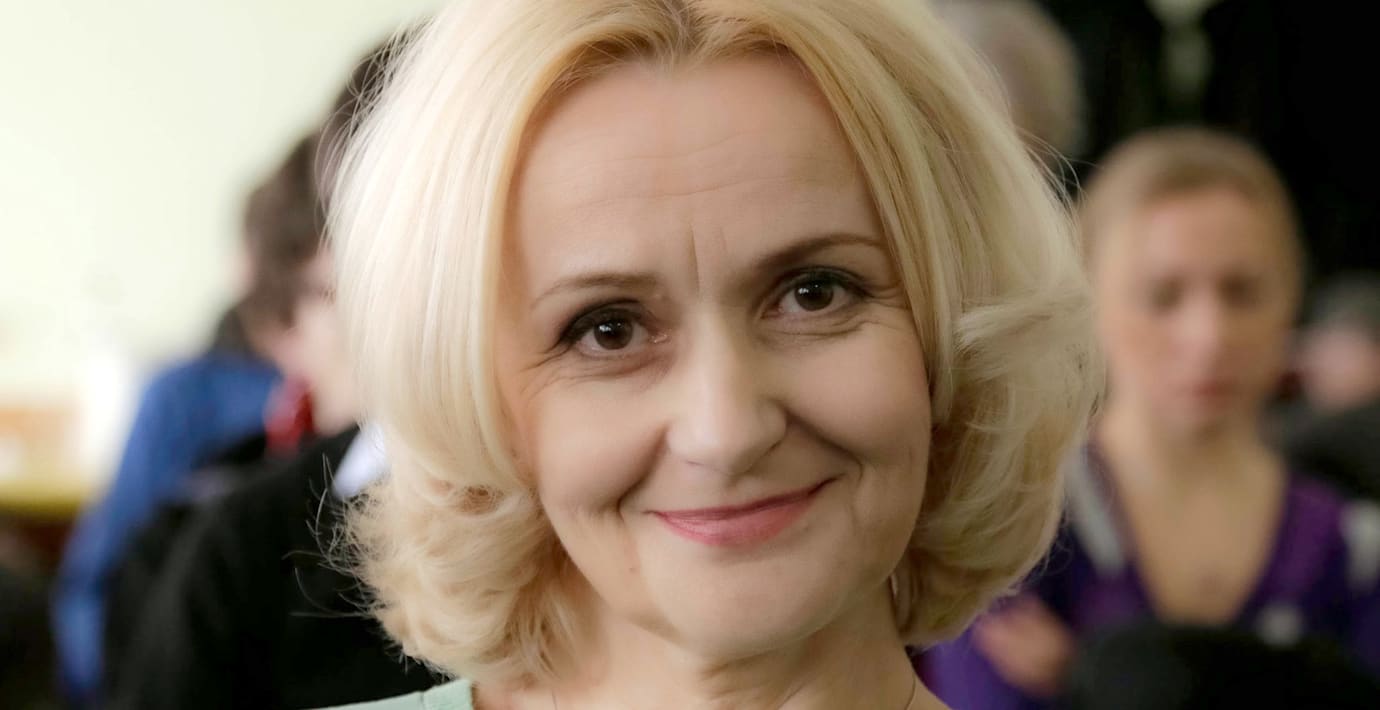Wikipedia (en)
Iryna Dmytrivna Farion (Ukrainian: Ірина Дмитрівна Фаріон, pronounced [iˈrɪnɐ ˈdmɪtrʲiu̯nɐ fɐrʲiˈɔn]; 29 April 1964 – 19 July 2024) was a Ukrainian linguist and nationalist politician who served as a deputy in the Verkhovna Rada as a member of Svoboda. She was also a professor at the Department of Ukrainian Language at Lviv Polytechnic (Institute of Humanitarian and Social Sciences).
She was known for her campaigns to promote the Ukrainian language and to discredit officials who spoke Russian.
Farion was born 29 April 1964 in Lviv. Her mother was a teacher and her father was a plumber.
Farion graduated from the philology department of Lviv University in 1987. Until 1991, she was head of the center of Ukrainian studies at Lviv University. During her college years, she was a member of the Communist Party of the Soviet Union, the only student being in the Communist Party. Farion at first denied membership within the Communist Party. Later, she claimed that she could not have such a career without joining the party; she also stated that she joined the party to "destroy it from within". In 1996, she defended her PhD dissertation in philology in Lviv University.
Among her scientific works are at least four monographs and 200 articles. From 1998 to 2004, Farion headed the language commission of Prosvita. From 1998, she initiated and organized the annual student competition "Language is a foundation of your life" (Ukrainian: Мова – твого життя основа, romanized: Mova – tvoho zhyttya osnova). In 2004, she received the Oleksa Hirnyk Literature Award.
In 2006, Farion balloted for People's Deputy of Ukraine mandate from the All-Ukrainian Union "Svoboda", of which she was a member beginning in 2005. In 2006, Farion also successfully balloted to the regional council, while in 2010, she won in a majoritarian electoral district of Lviv.
In February 2010, on International Mother Language Day, Farion was filmed telling kindergartners to avoid using Russian names. In one instance, she tells them to "go where the Mashas live" if they wanted to be called Masha; a video of the incident was aired on Russian state television and was widely criticized. The incident was also widely discussed and criticized in the Ukrainian media. One deputy from the Party of Regions asked the Prosecutor General of Ukraine to file a criminal case against her on the grounds of language-based and nationality-based discrimination.
In the 2012 parliamentary election, Farion was elected into parliament after winning a constituency in Lviv Oblast.
In the 2014 parliamentary election, Farion again tried to win a constituency seat in Lviv, but failed this time having finished third in her constituency with approximately 16% of the vote.
In July 2015, the Investigative Committee of Russia filed a criminal case against Farion on the charges of "incitement to murder" and "extremist statements".
In April 2018, she called Russian-speaking Ukrainians "mentally retarded" and claimed that they had caused the Russo-Ukrainian War. In October of the same year, she called ethnic Hungarians in the Zakarpattya Oblast "morons" and suggested that they "go back to Hungary", while comparing them to dogs. That year she also called for a campaign to "punch every Russian-speaking person in the jaw".
In March 2019, in response to journalist Dmitry Gordon's criticism of Stepan Bandera, Farion called him an enemy and wished him a "torturous death". For this, she was harshly criticized by the National Union of Journalists of Ukraine.
In the July 2019 Ukrainian parliamentary election, Farion again failed to return to parliament after finishing fifth with 10.35% of the vote in electoral district 116 in Lviv Oblast.
In November 2023, Farion insulted Russian-speaking fighters of the Azov Brigade in an interview and said that she would not call them Ukrainians. Farion also published a letter by a supporter in the occupied Crimean Peninsula; she did not blur his name, causing him to be arrested by Russian authorities. This caused public outrage, including criticism from politician Tamila Tasheva, and student protests at the Lviv Polytechnic Institute, but the institute refused to fire her. The incident led to Ukraine's human rights ombudsman to say that he had asked the Security Service of Ukraine (SBU) to open an investigation. On 15 November, the SBU opened an investigation against her on the counts of discrimination, insulting the dignity of a serviceman, violation of confidentiality of correspondence, and breach of inviolability of private life, and she was relieved of her position in the Lviv Polytechnic. She was reinstated at the Lviv Polytechnic in May 2024.
On 19 July 2024, at around 19:30 (EEST), Farion was shot in Lviv. The attacker was described to be a young man of about 20–25 years of age; according to Farion's neighbors, they had noticed him in the morning, waiting near her home. She was immediately admitted to the hospital in the emergency department with a gunshot wound to the head in an "extremely serious" condition. At around 23:00 EEST on the same day, doctors at the hospital announced that she was comatose and on life support. Farion died around 23:20 at the age of 60. The governor of Lviv, Danylo Sadovyi, expressed his condolences to her family.
Ukraine's Interior Minister Ihor Klymenko stated that the murder was premeditated and the main motives the investigators were considering were either her political and social activity or a personal dislike. Farion's political party, Svoboda, accused the Russian government of organizing her death.
Borys Hrinchenko Prize (2008)
Ukrainian family names of the Carpathian Lviv Region at the end of 18th – beginning of 19th centuries (with etymological dictionary). National Academy of Sciences of Ukraine, Institute of folklore studies. "Litopys". Lviv, 2001.
Antroponymy system of the Upper Dniester region at the end of 18th – beginning of 19th centuries (family names). Franko State University. Lviv, 1996 (Ph.D. thesis).
Profile at Svoboda website
Official website




